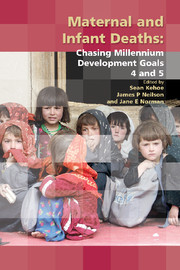Book contents
- Frontmatter
- Contents
- Participants
- Declaration of personal interests
- Preface
- The Millennium Development Goals
- SECTION 1 THE SIZE OF THE PROBLEM
- 1 The geography of maternal death
- 2 Delivering on neonatal survival to accelerate progress for Millennium Development Goal 4
- 3 Beyond the Numbers: reviewing maternal deaths and disabilities to make pregnancy safer
- 4 Human resource challenges
- SECTION 2 CLINICAL PROBLEMS AND SOLUTIONS – MATERNAL
- SECTION 3 CLINICAL PROBLEMS AND SOLUTIONS – NEONATAL
- SECTION 4 TRAINING AND DEVELOPMENT
- SECTION 5 SPECIFIC CHALLENGES IN SPECIFIC COUNTRIES
- SECTION 6 CONSENSUS VIEWS
- Index
2 - Delivering on neonatal survival to accelerate progress for Millennium Development Goal 4
from SECTION 1 - THE SIZE OF THE PROBLEM
Published online by Cambridge University Press: 05 February 2014
- Frontmatter
- Contents
- Participants
- Declaration of personal interests
- Preface
- The Millennium Development Goals
- SECTION 1 THE SIZE OF THE PROBLEM
- 1 The geography of maternal death
- 2 Delivering on neonatal survival to accelerate progress for Millennium Development Goal 4
- 3 Beyond the Numbers: reviewing maternal deaths and disabilities to make pregnancy safer
- 4 Human resource challenges
- SECTION 2 CLINICAL PROBLEMS AND SOLUTIONS – MATERNAL
- SECTION 3 CLINICAL PROBLEMS AND SOLUTIONS – NEONATAL
- SECTION 4 TRAINING AND DEVELOPMENT
- SECTION 5 SPECIFIC CHALLENGES IN SPECIFIC COUNTRIES
- SECTION 6 CONSENSUS VIEWS
- Index
Summary
Introduction
The enormous burden of almost 3.6 million neonatal deaths remains relatively invisible because of gaps in data or ineffective use of existing data, the perceived complexity and expense of solutions, and societal norms for seclusion of newborns and acceptance of neonatal deaths.
The data for action for neonatal survival highlight many commonalities with maternal survival and indeed mothers and their babies are intimately linked. Stillbirths are not mentioned in Millennium Development Goal (MDG) 4 or 5, yet they are largely preventable with the same solutions. Previous false dichotomies in advocacy and programmes for maternal and newborn survival have not been helpful in accelerating progress. An integrated call for action would be more likely to increase global visibility and national action. Health professionals and policy makers need to link numbers for mothers, newborns and stillbirths together, and to work together to implement the highest impact solutions that save women and babies.
This chapter reviews the progress for MDG 4 (child survival), with a focus on neonatal survival and on highlighting linkages with MDG 5 (maternal survival). Priorities for programmatic action based on the data are identified.
Progress for neonatal and child survival
The MDGs are the most widely ratified health and development targets ever. Nearly every nation has agreed to reach these eight interlinking goals that address poverty, hunger, education and health by 2015. Multiple reports have been published and many commitments have been agreed but is progress being made?
- Type
- Chapter
- Information
- Maternal and Infant DeathsChasing Millennium Development Goals 4 and 5, pp. 29 - 48Publisher: Cambridge University PressPrint publication year: 2010



